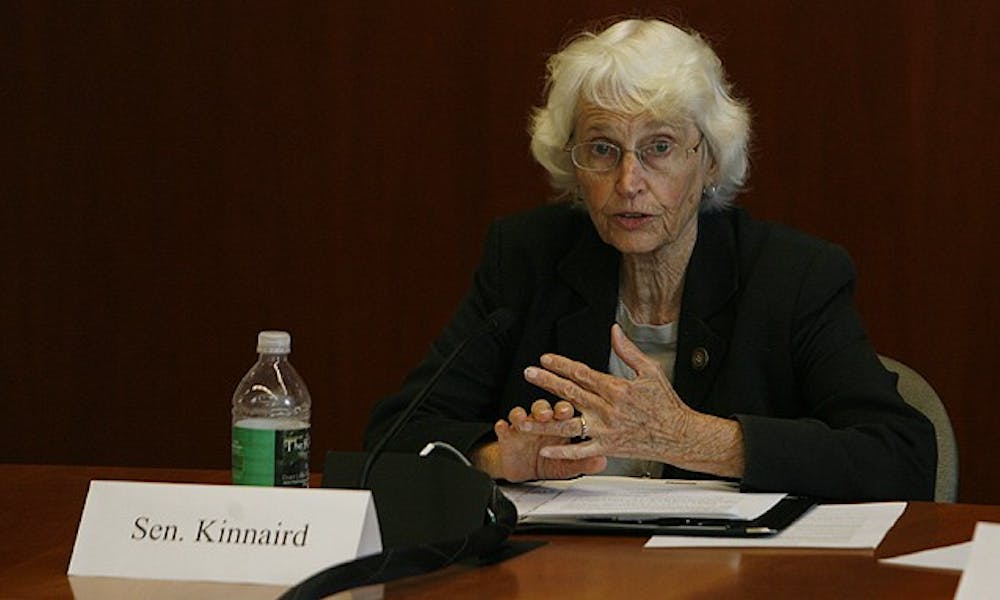If passed in the upcoming May referendum, the North Carolina Defense of Marriage amendment may have far-reaching effects on all couples.
Duke OUTLaw, the lesbian, gay, bisexual and transgender affinity group at the Duke School of Law, hosted a panel discussion Monday about the influence of the proposed amendment on gay and straight couples. The event, titled “Not Just About Gay Marriage: Why You Should Care About the N.C. ‘Marriage’ Amendment,” featured three speakers who criticized the bill on legal grounds.
Domestic partnerships, which are recognized in some parts of North Carolina, do not provide the same social perks as legal marriage does, but do give gay couples the opportunity to gain benefits from their employers. Passing the Defense of Marriage amendment would mean that marriage between a man and a woman is the only domestic legal union that will be recognized in North Carolina.
“My partner and I did a symbolic sign-up at the domestic partnership registrar on March 3, 2011—the 100th anniversary of Carrboro. We were so outraged at the marriage amendment that had come up for the first time in North Carolina,” said panelist Lydia Lavelle, former president of N.C. Association of Women Attorneys and assistant professor of law at North Carolina Central University School of Law.
Sen. Ellie Kinnaird, D-N.C., said she was proud that North Carolina was one of the few states without a marriage amendment. She attributed the recent amendment to the Republican-majority N.C. House of Representatives. Kinnaird, who represents Orange and Person counties, described the amendment as a continuation of past unequal legislation supported by the state legislature, such as the execution of the mentally incompetent and the “separate but equal” doctrine.
“We were wrong on imposing the death penalty and on segregation,” Kinnaird said. “I am hoping we will find eventually that [our law provides] an equal protection.... Wouldn’t it be great to be right for once?”
Sharon Thompson, attorney and former legislator in the N.C. House of Representatives, described the ramifications of the bill.
“The effects on my clients would be devastating,” she said, referring to her LGBT clientele. “It would erase all the legal protection we now have and leave them with not much of anything.”
Nicole Walley Baker, lab analyst at the Duke Center for Human Genome Variation, said the panel was primarily an advocation for defeating the bill.
“All the panelists feel personally invested—I don’t know anyone in the audience who supports the bill,” she said.
Thompson noted, however, that the potential harm of the marriage amendment could extend beyond the rights and potential benefits of gay couples.
“Opposite sex [couples] are going to lose domestic violence protection, child care benefits [and] domestic trust,” Thompson said. “It invites more family challenges if we leave the [legal] door open. There will be no legal rights to call into legal question what you can and cannot do.”
Haley Warden, president of OUTLaw and second-year law student, commented on the change the amendment poses to the state’s legal environment.
“Domestic legal union is a stranger to all of the jurisprudence in North Carolina,” Warden said. “It creates a lot of uncertainty that makes this amendment concerning. [Furthermore,] the language of the amendment is too overreaching—it hits too many people.”
Warden compared the current legal battle to previous anti-miscegenation laws, which banned interracial marriage.
“Oddly, we are about as we were with the miscegenation laws,” Warden said. “We have to overcome two hurdles—to prove that being gay is immutable and to insist on equal protection of law.”
Kinnaird said she is not optimistic about the possibility of defeating the amendment because of strong interest groups for the bill.
“I am afraid it is going to pass,” Kinnaird said. “The far-right churches are going to be very organized.”
But Thompson said coalitions including churches, social workers and LGBT groups are laying out strategies against the passing of the referendum,
“Millions of dollars are going to be spent on both sides—it’s going to get crazy,” she said.
Get The Chronicle straight to your inbox
Signup for our weekly newsletter. Cancel at any time.

